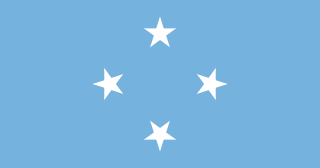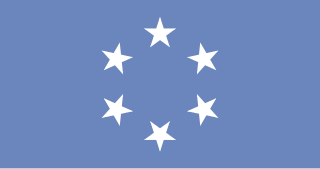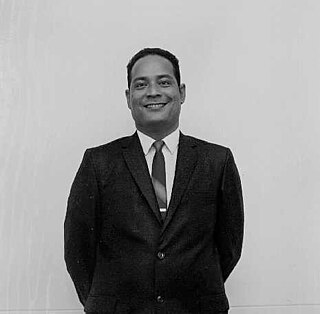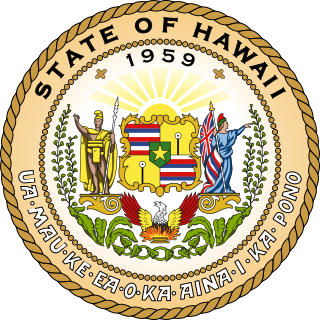Related Research Articles

The Federated States of Micronesia, or simply Micronesia, is an island country in Micronesia, a subregion of Oceania. The federation consists of four states—from west to east, Yap, Chuuk, Pohnpei and Kosrae—that are spread across the western Pacific. Together, the states comprise around 607 islands that cover a longitudinal distance of almost 2,700 km (1,700 mi) just north of the equator. They lie northeast of Indonesia and Papua New Guinea, south of Guam and the Marianas, west of Nauru and the Marshall Islands, east of Palau and the Philippines, about 2,900 km (1,800 mi) north of eastern Australia, 3,400 km (2,100 mi) southeast of Japan, and some 4,000 km (2,485 mi) southwest of the main islands of the Hawaiian Islands.

Honolulu is the capital and most populous city of the U.S. state of Hawaii, which is in the Pacific Ocean. An unincorporated city, it is the county seat of the consolidated City and County of Honolulu, situated along the southeast coast of the island of Oʻahu, and is the westernmost and southernmost major U.S. city. Honolulu is Hawaii's main gateway to the world. It is also a major hub for business, finance, hospitality, and military defense in both the state and Oceania. The city is characterized by a mix of various Asian, Western, and Pacific cultures, reflected in its diverse demography, cuisine, and traditions.

The Marshall Islands, officially the Republic of the Marshall Islands, is an island country west of the International Date Line and north of the equator in the Micronesia region in the Northwestern Pacific Ocean. The territory consists of 29 coral atolls and five islands, divided across two island chains: Ratak in the east and Ralik in the west. 97.87% of its territory is water, the largest proportion of water to land of any sovereign state. The country shares maritime boundaries with Wake Island to the north, Kiribati to the southeast, Nauru to the south, and the Federated States of Micronesia to the west. The capital and largest city is Majuro, home to approximately half of the country's population.

The Trust Territory of the Pacific Islands (TTPI) was a United Nations trust territory in Micronesia administered by the United States from 1947 to 1994. The Imperial Japanese South Seas Mandate had been seized by the US during the Pacific War, as Japan had administered the territory since the League of Nations gave Japan mandate over the area from Imperial Germany after World War I. However, in the 1930s, Japan left the League of Nations, and then invaded additional lands. During World War II, military control of the islands was disputed, but by the end of the war the islands had come under control of the Allies. The Trust Territory of the Pacific was created to administer the islands as part of the United States, while still under the auspices of the United Nations. Most of the island groups in the territory became independent states, with some degree of ties kept with the United States: the Federated States of Micronesia, Marshall Islands and Palau are today independent states in a Compact of Free Association with the US, while the Northern Mariana Islands remain under US jurisdiction, as an unincorporated territory and commonwealth.

Linda Lingle is an American politician who served as the sixth governor of Hawaii from 2002 to 2010. She was the first Republican elected governor of Hawaii since 1959, and was the state's first female and first Jewish governor. Prior to serving as governor, Lingle served as mayor of Maui County from 1991 to 1999 and as chair of the Hawaii Republican Party from 1999 to 2002.

The Compacts of Free Association (COFA) are international agreements establishing and governing the relationships of free association between the United States and the three Pacific Island sovereign states of the Federated States of Micronesia (FSM), the Republic of the Marshall Islands (RMI), and the Republic of Palau. As a result, these countries are sometimes known as the Freely Associated States (FASs). All three agreements next expire in 2043.

TheBus is the public bus transportation service on the island of Oʻahu, Hawai'i, in the United States. In 2023, TheBus had a ridership of 41,661,900, or about 135,000 per weekday, and its fleet comprised 518 buses and 207 paratransit vehicles. As of June 2024, these vehicles provide daily service on 115 routes, including three rapid transit routes and two limited express routes. All buses are equipped with bike racks. TheBus is privately managed by the nonprofit Oahu Transit Services Inc., which operates the system under a public-private partnership with the City and County of Honolulu's Department of Transportation Services.

Charles Kong Djou is an American politician who served as U.S. representative for Hawaii's 1st congressional district from 2010 to 2011. Djou won his House seat in a May 2010 special election. He was defeated in the November general election after the Democratic primary provided a single opponent. He ran for but did not win his old House seat again in 2012 and 2014. Djou, who previously served in the Hawaii House of Representatives and on the Honolulu City Council, was the first Thai American of any party and the first Chinese American Republican to serve in the U.S. House of Representatives. In June 2016, he entered the race for mayor of Honolulu, which he lost, 48% to 52%, to incumbent Kirk Caldwell. As of 2024, Djou is the last Republican to have represented Hawaii in Congress. He left the Republican Party in 2018 and in 2020 endorsed Joe Biden for president. After Biden won the presidency, he appointed Djou to be Secretary of the American Battle Monuments Commission.

Brian Emanuel Schatz is an American educator and politician serving as the senior United States senator from Hawaii, a seat he has held since 2012. A member of the Democratic Party, Schatz served in the Hawaii House of Representatives from 1998 to 2006, representing the 25th legislative district; as the chairman of the Democratic Party of Hawaii from 2008 to 2010; and as the 12th lieutenant governor of Hawaii from 2010 to 2012.

Pacific Islander Americans are Americans who are of Pacific Islander ancestry. For its purposes, the United States census also counts Aboriginal Australians as part of this group.

Colleen Wakako Hanabusa is an American lawyer and politician who served as the U.S. representative for Hawaii's 1st congressional district from 2011 to 2015 and again from 2016 to 2019. A member of the Democratic Party, she ran for her party's nomination for governor of Hawaii in 2018, challenging and losing to incumbent and fellow Democrat David Ige.

Marshall Islands–United States relations are bilateral relations between Marshall Islands and the United States.
Micronesian Americans are Americans who are descended from people of the Federated States of Micronesia. According to the 2020 US Census, a total of 21,596 residents self-identified as having origins in the country, which consists of four states. More than half of these residents identified their origin as Chuuk State (12,464) with the rest as follows: 4,918 people from Pohnpei, 2,066 from Yap, and 2,148 people from Kosrae.

Honolulu County, officially known as the City and County of Honolulu, is a consolidated city-county in the U.S. state of Hawaii. The city-county includes both Urban Honolulu and the rest of the neighborhoods on the island of Oʻahu, as well as several minor outlying islands, including all of the Northwestern Hawaiian Islands except Midway Atoll.

Andon L. Amaraich was a Micronesian public servant, politician, diplomat and judge. He was, at the time of his death, Chief Justice of the Supreme Court. He has been described by the Micronesian government as "one of the founding fathers of the Federated States of Micronesia".

The 2014 United States House of Representatives elections in Hawaii were held on Tuesday, November 4, 2014 to elect the two U.S. representatives from the state of Hawaii, one from each of the state's two congressional districts. The elections coincided with the elections of other federal and state offices, including an election for Governor of Hawaii and a special election to the United States Senate.
Sha Merirei is the handle used by Palauan-American artist and activist Sha Merirei Ongelungel. She was one of the earliest known Palauans to have an internet presence, promoting art, Palauan culture, and Palauan music in the late 1990s. In December 2014, she launched the first Palauan online radio station called Native ExPat Radio. That same month, she was named Miss LGBTQ by the Palau Humanities Project. She is the daughter of Palauan artist, Hans Ongelungel.
Island Soldier is a 2017 American documentary film written, directed and produced by former Peace Corps volunteer Nathan Fitch. The film deals with problems faced by United States Military families from Kosrae who are citizens of Federated States of Micronesia. Because of a free association agreement called the Compact of Free Association, they can serve, fight and die for the US in Afghanistan and Iraq but they cannot vote.

The 2020 Honolulu mayoral election determined the Mayor of the City and County of Honolulu for the term commencing in January 2021. Incumbent mayor Kirk Caldwell was ineligible to run for a third term due to term limits.

The 2022 United States House of Representatives elections in Hawaii were held on November 8, 2022, to elect the two U.S. representatives from the state of Hawaii, one from each of the state's two congressional districts. The elections coincided with other elections to the House of Representatives, elections to the United States Senate and various state and local elections.
References
- ↑ "Online movement exposes discrimination against Micronesians in Hawaii". RNZ. 2018-10-17. Retrieved 2020-07-24.
- ↑ "USCompact.org | U.S. Compact of Free Association with the FSM and the RMI". uscompact.org. Retrieved 2020-07-24.
- 1 2 3 "An Untold Story of American Immigration". Honolulu Civil Beat. 2015-10-14. Retrieved 2020-07-24.
- ↑ "No Aloha for Micronesians in Hawaii". Honolulu Civil Beat. 2011-06-10. Retrieved 2020-07-24.